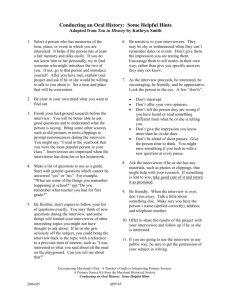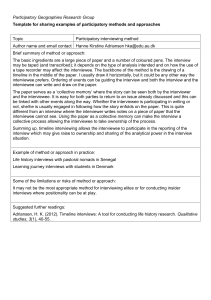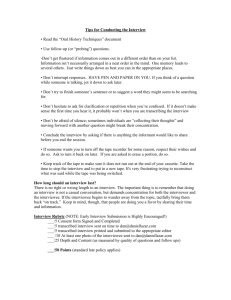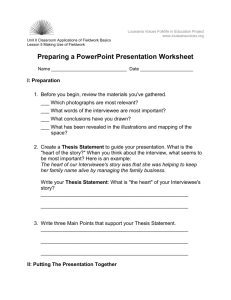conditions of use form for oral history interviews
advertisement
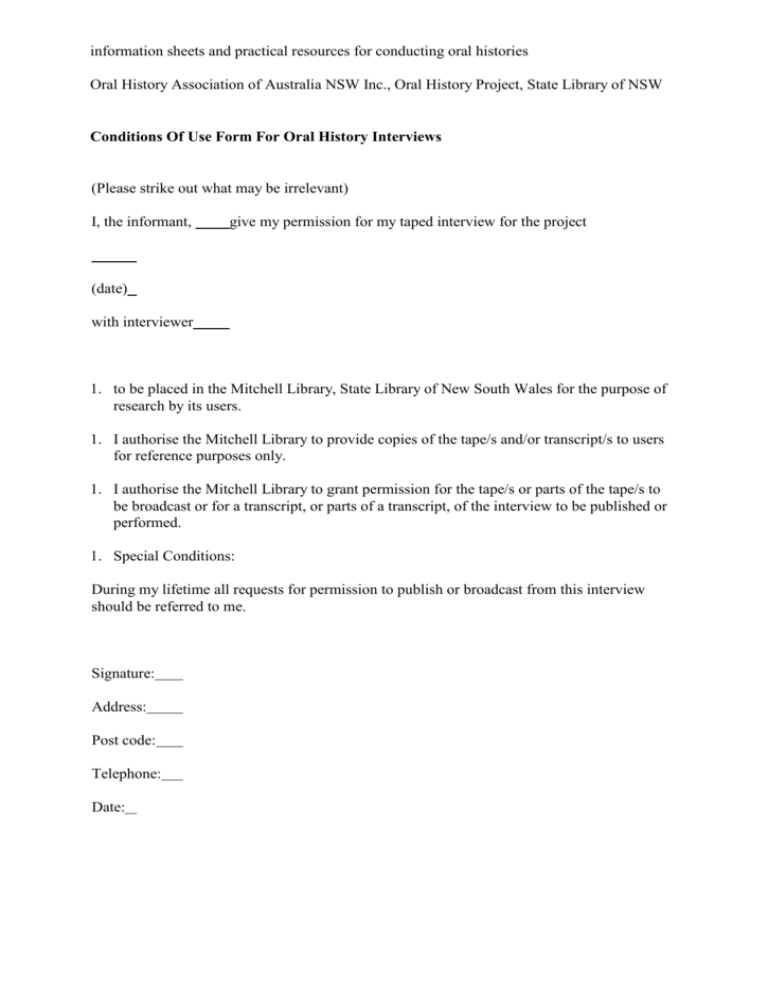
information sheets and practical resources for conducting oral histories Oral History Association of Australia NSW Inc., Oral History Project, State Library of NSW Conditions Of Use Form For Oral History Interviews (Please strike out what may be irrelevant) I, the informant, give my permission for my taped interview for the project (date) with interviewer 1. to be placed in the Mitchell Library, State Library of New South Wales for the purpose of research by its users. 1. I authorise the Mitchell Library to provide copies of the tape/s and/or transcript/s to users for reference purposes only. 1. I authorise the Mitchell Library to grant permission for the tape/s or parts of the tape/s to be broadcast or for a transcript, or parts of a transcript, of the interview to be published or performed. 1. Special Conditions: During my lifetime all requests for permission to publish or broadcast from this interview should be referred to me. Signature: Address: Post code: Telephone: Date: Stages of an Oral History project Keep a Diary 1 Inspiration and motivation What is oral history? Variety of uses 2 Preparation Be realistic Topic Nature of memory Is memory reliable? Questions Questionnaires Interview skills Equipment Ethics Copyright Practice interview Selecting interviewees 3 The interview Before Specific background preparation Interviewee profile Location and time Checklist During The interview Other sources Informal conservations After Interview evaluation Ongoing contact 4 Processing the interviews Keeping records Transcribing Accessing interview contents Storage and preservation Consultation with interviewee/s 5 Final product Audience Form and focus Evaluating interview contents Editing Introductions & commentaries Photographs & illustrations Interviewee review & approval The first draft The end! Interview Skills DO be a good and interested listener follow your interviewee's train of thought stick to a fruitful area and follow it through while the memories are flowing be sensitive to your interviewee's feelings, values and needs be aware of your own biases and prejudices beware of conservation be patient use appropriate language ask for descriptions and examples use sensitive 'open-ended' and 'follow-up' questions as often as possible. be alert to touchy subjects and don't just blunder in follow up emotions eg How did you feel about it? How did you react? probe generalisations allow your interviewee to complete a story. encourage interviewees to reconstruct conversations eg And what did the mayor say then? encourage interviewees to reconstruct physical environments eg. Could you take me on an imaginary walk through the house? respect silences if they are pauses while your interviewee collects and/or selects memories. be able to pick up leads, make a note, and return to a point later provide positive reinforcement to assure your interviewees that the memories they are offering are worthwhile eg That's a very interesting point. Could you tell me more about that? ask for and make use of family photographs and other personal documents and papers. spend time with your interviewee when the interview is over DON'T interrupt a story impose your way of thinking or your order of topics dominate the interview ask complicated questions ask leading questions interrogate your interviewee ask questions which have already been answered ask questions by telling all you know first put forward your opinions or make moral judgements be afraid of silences and pauses Orientation and tape identification questions 1. This is (interviewer's name) interviewing (interviewee's name) on 25 October 1995 at her home in Burwood, Sydney 2. May I ask you to give your full name and spell it please? 3. When and where were you born? 4. What were your parents' names? 5. Where was your mother born and when? 6. Where was your father born and when? 7. Where did your parents meet and marry (or set up house together)? 8. Do you know anything about your grandparents? (Names, date and place of birth, education, occupation) 9. What was your mother's occupation before marriage? After marriage? 10. What was your father's occupation? 11. Please give the names of your brothers and sisters. Orientation questions for a 'narrow focus' interview 1. to 8. As above (9., 10., 11. may of course be asked, but may be deemed not to be particularly relevant) A good concluding question may be: Is there anything more you would like to add? A sentence of thanks follows this very naturally. Note: Before the interview it is useful to advise your interviewee that you will be asking some family background questions. If you are interviewing in a much narrower focus it is indeed essential to explain this else the interviewee might be somewhat surprised. For example if you are interviewing about someone's professional life the interviewee would not necessarily expect a detailed series of questions in regard to family background. It may be useful to explain that in the future, as now, many of the researchers may be family historians and this sort of genealogical information may well be germane to a future researcher's quest. The other reason (not necessarily shared with interviewee) is that these are questions easily answered and therefore they do a great deal to reassure the interviewee. There is usually a general air of relief after these questions. Rosemary Block, Curator of Oral History, State Library of New South Wales Types of Questions: AVOID: Double barrelled or complicated Leading Confronting Jargon USE MIXTURE OF: • Open ended • Closed or direct • Evaluative • Follow up Memory Memories are Of things we understand & don't understand Of things in which we are interested Organised Selective Reconstructed Memories are influenced by Age Gender Class Cultural background Subsequent experiences Changes in social values and attitudes, Other people The interviewer What do we remember? Places Events Activities Daily routines People Feelings Attitudes Values Sounds Smells Images Taste What don't we remember? Dates Statistics Genealogical information ''Facts'' and lists Chronology How reliable are our memories? Reliable in descriptive detail Aware of changing values Memory constant, evaluation may change Ethical Guidelines The Oral History Association was formed in 1978 to promote the practice of oral history in Australia. There are branches of the Association in each State which provide information and forums for discussion about oral history. The Association is concerned that due regard is given to ethical practices and strongly advises that the following guidelines be followed by anyone involved in oral history. Oral history involves recording, preserving and making available candid information that may be sensitive or confidential. The Association advises all interviewers to act to preserve the rights and responsibilities of the different parties involved and to refuse to work in any other way. The interviewer's responsibilities are to protect the rights of interviewees by explaining: the purpose of each interview, how it will be organised and recorded, whether it will be placed in a repository, and what interviewees will receive after the interview, such as a copy of the tape, transcript or planned publication oral history copyright, the implications of assigning copyright to another party, and the rights of interviewees to have a say in the use of their material by asking for anonymity and/or placing restrictions on use of the interview during their lifetime possible future use of interviews by all parties involved such as the interviewer, interviewee, and a repository giving each interviewee an agreement to sign which clearly states whether the interviewee will retain copyright or assign it to another party and under what conditions assignment of copyright is granted; any change in use not covered in the original agreement would need to be renegotiated conducting interviews with objectivity, honesty and integrity being aware of defamation laws and the implications, for all parties concerned, of recording potentially defamatory material treating every interview as a confidential conversation until an interviewee gives the right to share information through an agreement ensuring that interviewees are given the opportunity to review, correct and/or withdraw material ensuring that interviews are preserved for future researchers by, if possible, placing them in a repository under conditions agreeable to the interviewee. LOG SHEET FOR PROCESSING INTERVIEWS TIME SUBJECT MIN:SEC NAMES AND KEYWORDS TAPE: PT2 START SIDE A 00:00 - 00:24 Leader and Identification 00:24 - 01:20 Education. 1926 Bursary. Left at third year certificate stage. Odd jobs. 01:20 - 04:40 Apprentice in fitting and turning with NSW Railways. Interview in building in what is now Australian Graduate School of Engineering Innovation. Crude working conditions. Description of typical day working including evening attendance at Sydney Tech. 44 hour week. North Sydney Boys High School 7.30am - 5pm Mon -Fri & Sat Morning. 04:40 - 05:12 Last term in new loco shop. Lots of handcraft which was good training. Chipping, filing, working lathes, shapers and slotters. Then got into drawing office. Eveleigh workshop 05:12 - 06: 20 Applied for and nominated for scholarship in October and had to qualify for university entrance by end of January. Four months to educate from third year certificate stage to matriculation. Eddie Memorial Scholarship 06: 20 - 07:47 Attended coaching college and helped by Metropolitan draftsmen in office. Passed and won Coaching College. scholarship for 150 Pounds a year. Holiday jobs available due to apprentice experience. Sydney University 07: 47 - 11:40 Third term in third year practical experience at sea as 9th Engineer. Gained membership of marine engineers. Twin Screw steam engine ship built in Germany for Kaisers triumphant tour around the world after winning the war. Given as reparation after the war. 'Morella'. Jack Burgess Fifth Engineer 11 :40 - 13:25 Observations of six months ship board experience. Found marine engineers often move into power station work when they go ashore as work is similar. 13:25 - 16:00 Graduated in 1939 in combined electrical and mechanical degree. Found it interesting for a practical person to find out how things are designed. Went back to railway to find that he was to get no credit for four years of University. Tom Hardigan Job with Sydney County Council as member of efficiency staff at Bunnerong. Describes getting to work. Responsible for water management, Bunnerong Power Station 16:00 - 17:50 Funnell fuel efficiency and station efficiency. Age 26 when started at Bunnerong. Date of birth. 17:50 -18:30 After ten months at power station applied for job at Commonwealth Railways. Employed as draftsman. 18:30 – 20:45 Problems with boiler efficiency due to water and scale and poor coal. TIME SUBJECT NAMES AND KEYWORDS 20:45 - 21:30 War broke out about the same time as he started and there was a need for increased train services as part of war plan. Macarthur 21:30 - 21:45 First job involved in design of dining car. 21:45 - 23:10 Promotion from draftsman to chief draftsman then Works Manager. Locomotive Superintendent Central Australian Railway. Given one days notice to take over. MIN:SEC 23 :10 - 24:26 Had learnt to shunt and drive when working in Sydney. Practical experience and his apprenticeship made it easier to be accepted. 24:26 - 26:38 Descriptions of trains and services. Water problems. Port Augusta Korn, Peterborough. Milsons Point. Ghan, Indian Runner, Afghan, 26:38 - 29:25 Poor coals. Description of 'prime' and how it was controlled. Lack of skilled drivers and firemen and no train control. 29:25 - 32:20 Train control was instituted with help of the South Australian Railways. " Learn the road. " 32:20 - 33:45 Appointed Chief Mechanical Engineer at the age of thirty of a system in chaos. 33 :45 - 41:30 Returned to Sydney and offered job with ACI. Then Commonwealth Engineering offered position to open up new factory in Brisbane to construct carriages for Queensland Railways. Air-conditioning requirements required change to steel frame from timber frame. 41:30 - 44:56 Tom Playford 'Prime' Quorn to Alice Springs Newcastle Flyer Sunlander. Description of how staff were obtained by Bob Burns putting agent on migrant ships in Perth and encouraging the right people to stay on the ship until Brisbane. Assembled team of 26 draftsmen with no railway design to design new steel frame train from first principles. Huge task. END SIDE A Oral History — Some Definitions and Expansions Oral history is a record of information gathered in oral form, usually on tape as the result of a planned interview. Library of Congress Oral history is a record of information usually on tape, as the result of a planned interview. Its purpose is to create a record where none exists or to supplement existing records for future research. Oral history is a method of recording spoken language, eyewitness accounts and insights into society and its changing values and attitudes. It also gives a voice to those previously denied the chance to contribute to the recording of history. New Zealand Oral History Archive So never mind those who fret at how valid oral history is, at how reliable is memory. Those were never the big questions of oral history. All sources have problems of validity and reliability: that is why history and the past are different. Bill Gammage, Oral History Association of Australia Journal No 20: Crossing Borders Oral history is the product of two minds interacting. Mere tape recording, such as an individual self recording his memoirs, is not oral history. Rather, the intervention of a trained interviewer's curiosity is required if the product is to have widest historical value. Church of Jesus Christ of Latter-Day Saints Oral history records provide three major categories of information, which can be described as sensory, complementary and original...Oral history's abilities to affect the feelings as well as the intellect, gives an essentially human underlining to the facts that the recording also conveys...Oral history records are also of value in that they can be created and used to complement other record sources. The third contribution of oral history is that it can open fields which otherwise would he closed to historians and, in this respect, provides information which is original in character for distinct subject areas. For studying many social and occupational groups which do not leave written records of their lives and work, oral history is a fundamental and sometimes the only tool. In terms of historical research it is in this area that oral history can make its most substantial contribution. David Lance, An archive approach to oral history. (IASA 1978) Oral history is a history built around people. It thrusts life into history itself and it widens its scope. It allows heroes not just from the leaders, but from the unknown majority of the people. It encourages teachers and students to become fellow-workers. It brings history into, and out of, the community. It helps the less privileged, and especially the old, towards dignity and self-confidence. It makes for contact — and thence understanding — between social classes, and between generations. And to individual historians and others, with shared meanings, it can give a sense of belonging to a place or in time. In short, it makes for fuller human beings. Equally, oral history offers a challenge to the accepted myths of history, to the authoritarian judgement inherent in its tradition. It provides a means for a radical transformation of the social meaning of history. Paul Thompson, The voice of the past. Oral history. OUP 1990
